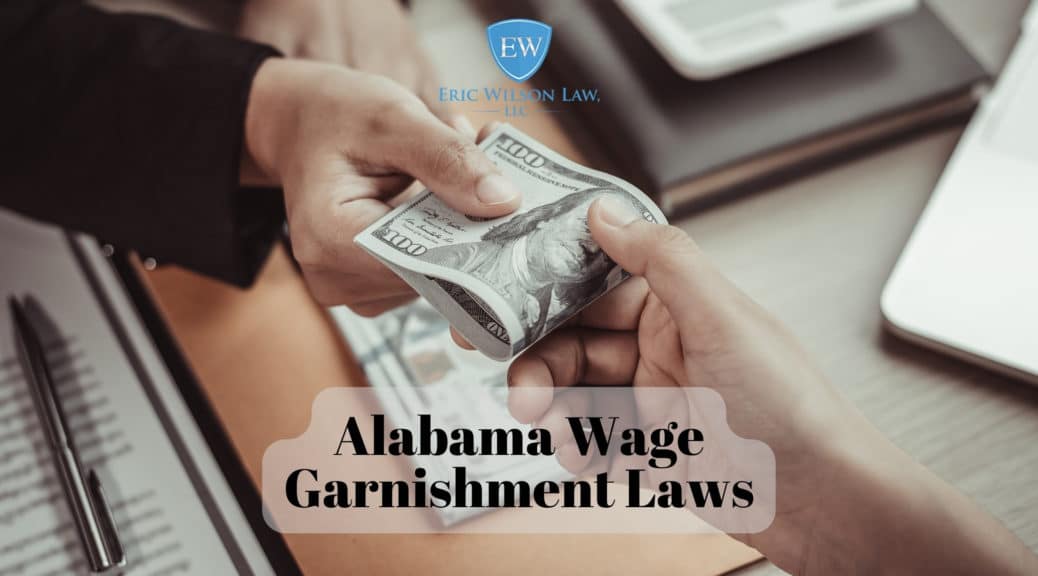When you have mountains of debt, there’s lots to worry about. How can I afford to pay rent or my mortgage? How can I afford lunch this week? How am I going to pay this off? And maybe even: are my creditors going to start garnishing my wages? If so, how much money are they going to take out of my paycheck? The answer to the last two questions often depends on the state you live in. Bankruptcy lawyer Eric Wilson has extensive knowledge about wage garnishment Alabama, and how these specific state laws affect debtors on a monthly basis. Not only that, he can potentially stop wage garnishment through bankruptcy relief and other legal services. Call 205-349-1280 for a free consultation.
What is Wage Garnishment?
Wage garnishment is basically when creditors instruct your employer to send a certain amount of your paycheck to them in order to pay off your debts. Most of the time, creditors must sue you and receive a money judgment from a bankruptcy court in order to garnish your wages. But if you have unpaid child support, federal student loans, alimony, or taxes, creditors can skip the suing and money judgment step. In this case, creditors can just begin garnishing your wages because they have a statutory right to do so.
How Much Money Can Creditors Take Out of Your Paycheck?
Creditors can’t just take your whole paycheck. Federal law limits them from seizing more than 25% of your weekly disposable earnings or the amount of your weekly disposable earnings multiplied by 30 times the federal minimum wage, whichever is less (15 U.S.C. § 1673). In order to make this easier to understand, let’s do some basic math.
Let’s say that you have about $400 of weekly disposable income after taxes and other legally required deductions. 25% of $400 equals $100.
Meanwhile, $7.25 (the federal minimum wage) multiplied by 30 equals $217.50. Because $100 is less than $217.50, your creditors would likely take only $100 per week out of your paycheck.
Meanwhile, individual state laws differ on wage garnishment limits.
Alabama Wage Garnishment Laws
Wage garnishment laws in Alabama are basically the same as federal laws. According to Alabama law, creditors can’t take more than 25% of your weekly disposable earnings or they can’t take an amount of your disposable income that exceeds 30 times the federal minimum hourly wage, whichever is less (Ala. Code § 6-10-7). This rule only applies to debts like credit card debt, medical debt, etc. If you owe taxes, alimony, or child support payments, for example, the wage garnishment limit is different.
Wage Garnishment Limits for Student Loans, Taxes, and Child Support
As stated previously, a wage garnishment order isn’t necessary for student loans, taxes, and child support. In many cases, creditors can garnish way more of your money in order to pay off these types of debts.
Unpaid Child Support
If you’re supporting a spouse or child, creditors can take up to 50% of your disposable income to pay off your child support. Meanwhile, if you’re not supporting a spouse or child, creditors can take up to 60% of your disposable earnings. Additionally, if you have more than 12 weeks’ worth of child support arrears, creditors can take an extra 5% of your disposable income.
Federal Student Loans
If you’ve consistently failed to pay your student loans, the U.S. Department of Education can take up to 15% of your weekly income in order to pay off your debt.
Unpaid Income Taxes
Wage garnishment for unpaid income taxes is called a levy. Determining the limits here is much more complicated. The exempt amount of money from your weekly income is determined by your standard deductions and as well as the aggregate amount of deductions for your personal exemptions in that tax year. That number is then divided by 52.
You must specifically state your standard deductions as well as the number of dependents you claim on your taxes. If not, the IRS will determine the exempt amount on the standard deductions for a married person who is filing alone with only one personal exemption.
Which Sources of Income Are Exempt From Wage Garnishment in Alabama?
There are some sources of income that creditors can’t touch, and they are called exemptions. In Alabama, creditors can’t take money from your:
- Social security,
- Disability benefits,
- Unemployment benefits,
- Child support payments that you receive from an ex-spouse,
- Pension or retirement program payments,
- Social Security Income (SSI).

Can I Get Fired Because of Wage Garnishments?
According to federal law, you can’t get fired over just one wage garnishment order. However, if you have more than one, you can certainly get fired.
Alabama laws are slightly different here. Employers can’t refuse to hire you or fire you if you have withholding orders for child support or criminal restitution.
How Can I Protect My Wages from Garnishment?
You can potentially protect your wages through an objection or exemption claim. In many cases, you should receive instructions in your wage garnishment order about how to file an objection. If you didn’t, you can contact your local court and ask for these instructions.
Basically, you’ll have to file a written objection if you want to potentially protect your wages. This written objection should include:
- Case number and case caption (for example: ABC Bank vs. Jane Doe)
- Objection date
- Your name
- Your contact information
- An explanation of why you’re objecting the wage garnishment order or an explanation of why your wages are exempt from garnishment
- Your signature
Shortly after filing your objection, you must attend a garnishment hearing. This hearing will determine if your objection is sustained or overruled. If you need assistance, support, and legal advice during the wage garnishment objection process, call a bankruptcy attorney at Eric Wilson Law LLC.
How to Stop Wage Garnishment
In many cases, filing bankruptcy truly is the best option for people facing wage garnishment. Thanks to the automatic stay that comes with a bankruptcy petition, creditors have to stop harassing you about your debt. It’s important to note that while an automatic stay will stop garnishment and most collection efforts, it doesn’t protect you from everything. High priority, unpaid debts such as alimony and child support are still subject to wage garnishment even with an automatic stay in place.
The automatic stay begins right when you file bankruptcy and ends when you receive your bankruptcy discharge. An experienced bankruptcy lawyer at Eric Wilson Law LLC will gladly walk you through the entire bankruptcy process and do everything in their power to protect you from creditors who garnish your wages.
Other Ways to Stop Wage Garnishment
Filing for Chapter 7 or Chapter 13 bankruptcy isn’t the only way to get relief from wage garnishment. Listed below are other options.
Claim Economic Hardship
If wage garnishments are truly causing you economic hardship and preventing you from getting food on the table, you can say that through a court petition. You may not be able to stop garnishment altogether, but you could keep more money from your monthly paychecks.
Claim Creditor Violation
Sometimes creditors break the rules and take too much money away from vulnerable debtors. Sometimes creditors even fail to properly notify debtors that they’re about to garnish wages. If you can prove that either of these violations occurred, you may be able to stop future wage garnishments.
Undergo Debt Counseling
You may be able to undergo debt counseling at a debt relief agency, such as Eric Wilson Law LLC, in order to avoid wage garnishment altogether. A debt counselor could help you avoid this by creating a settlement with your creditors. If they agree to it, you could slowly pay off your debts over time.
Undergo a Trusteeship
Working directly with a bankruptcy trustee can prevent wage garnishment. Creditors legally can’t garnish your wages while you’re in a trusteeship. Under this trusteeship, all you would have to do is pay your creditors through a lump sum paid to your trustee.
Call an Alabama Wage Garnishment Lawyer Today
If you’re at risk of wage garnishment and you’re wanting to file for bankruptcy in order to stop it, the bankruptcy lawyers at our law firm want to stand by you. At Eric Wilson Law LLC, we are passionate about protecting our clients from aggressive debt collectors and the stress of financial ruin. Our debt relief agency provides an abundance of legal resources that can potentially stop wage garnishment Alabama. Call us today at 205-349-1280 for a free consultation. We’re ready to begin an attorney-client relationship with you.


